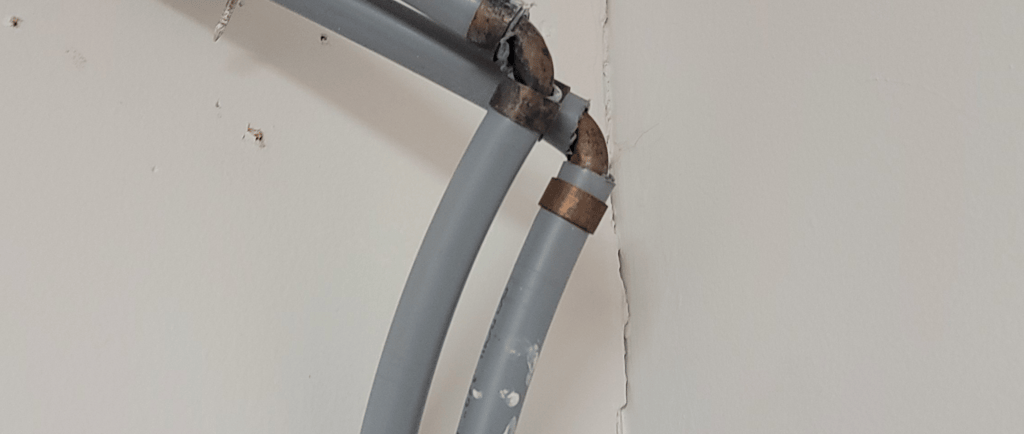Poly B Plumbing: What You Need to Know About Polybutylene Pipes
If you’re in the process of buying a home, or if you own an older property, you may come across the term "Poly B" or polybutylene plumbing. While it was once a popular material for water supply pipes, polybutylene plumbing has a history of problems that can lead to costly repairs. Understanding what polybutylene pipes are and the risks they present is essential for homeowners and buyers alike.
RESIDENTIAL


If you’re in the process of buying a home, or if you own an older property, you may come across the term "Poly B" or polybutylene plumbing. While it was once a popular material for water supply pipes, polybutylene plumbing has a history of problems that can lead to costly repairs. Understanding what polybutylene pipes are and the risks they present is essential for homeowners and buyers alike.
What Is Polybutylene Plumbing?
Poly B, short for polybutylene, is a type of plastic resin that was used to manufacture water supply pipes from the late 1970s to the mid-1990s. Polybutylene pipes were a popular choice due to their low cost and ease of installation.
The pipes are typically:
Gray or blue in color: Gray for interior use and blue for exterior use.
Flexible: Making them easy to install in tight spaces.
Used for water supply: They’re often found connected to water heaters, bathrooms, kitchens, and even main water lines.
Why Is Polybutylene a Concern?
Despite its initial popularity, polybutylene plumbing turned out to have significant drawbacks. Over time, it became evident that polybutylene pipes are prone to failure, often without warning. The main issues include:
Chemical reactions with water treatment agents: Polybutylene pipes can react with chlorine and other oxidants commonly found in public water systems, causing the pipes to weaken and become brittle.
Sudden failures: Pipes can develop cracks or leaks that lead to significant water damage.
Costly repairs: A failure in a polybutylene system can result in extensive water damage, mold growth, and expensive repairs.
Because of these problems, polybutylene pipes have been the subject of class-action lawsuits, and many insurance companies now refuse to cover homes with polybutylene plumbing.
How to Identify Polybutylene Pipes
If you suspect your home has polybutylene pipes, here are some key characteristics to look for:
Color: Polybutylene pipes are typically gray.
Location: They may be visible near your water heater, under sinks, or in crawl spaces.
Stamping: Polybutylene pipes often have the code “PB2110” or "QUEST" stamped on them.
If you’re unsure whether your home has polybutylene plumbing, a professional home inspector can confirm its presence during an inspection.
What Should You Do If Your Home Has Polybutylene Plumbing?
If your home has polybutylene pipes, it’s important to take action to prevent future problems:
Get a thorough inspection: A certified home inspector can assess the condition of your polybutylene plumbing and provide recommendations on the next steps.
Consider replacing the pipes: While polybutylene pipes don’t always fail, the risk is high enough that many experts recommend proactive replacement. Replacing the plumbing system can save you from unexpected repairs and water damage.
Check your insurance: If you’re purchasing a home with polybutylene plumbing, check with your insurance company to see if they provide coverage. You may be required to replace the pipes before obtaining coverage.
Buying or Selling a Home with Polybutylene Pipes
If you’re buying a home with polybutylene plumbing, factor the cost of replacement into your decision. While it may not be an immediate dealbreaker, it’s something you’ll want to address sooner rather than later. On the other hand, if you’re selling a home with polybutylene pipes, it’s important to disclose this to potential buyers and consider offering concessions for pipe replacement.
While polybutylene plumbing may have been a cost-effective solution decades ago, it’s now known for its potential risks and high failure rates. At Just Call Joe Inspections, we understand the importance of protecting your home from potential plumbing disasters. Our certified inspectors can help you identify and address polybutylene pipes, ensuring your home is safe and sound for years to come.
If you’re concerned about polybutylene plumbing in your home or a home you’re purchasing, contact us today for a thorough inspection and expert advice!